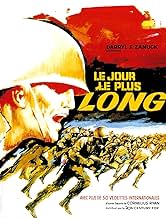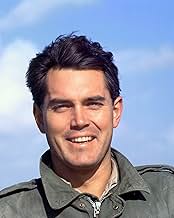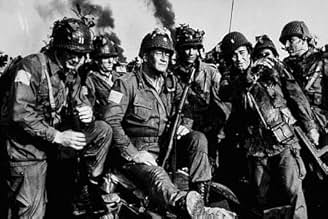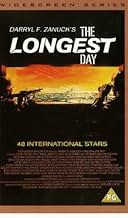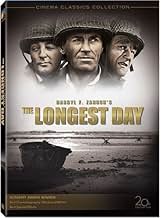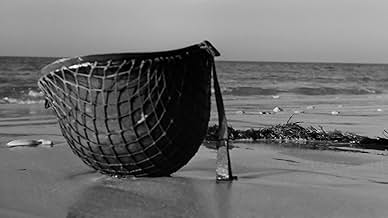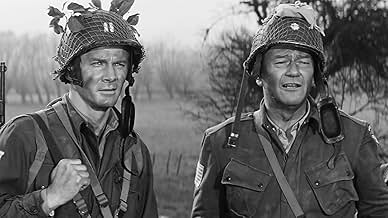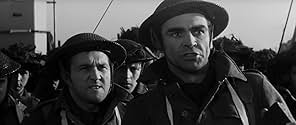The events of D-Day, told on a grand scale from both the Allied and German points of view.The events of D-Day, told on a grand scale from both the Allied and German points of view.The events of D-Day, told on a grand scale from both the Allied and German points of view.
- Won 2 Oscars
- 8 wins & 6 nominations total
Irina Demick
- Janine Boitard
- (as Irina Demich)
Storyline
Did you know
- TriviaWhile clearing a section of the Normandy beach near Pointe du Hoc, the crew unearthed a tank that had been buried in the sand since the original invasion. Mechanics cleaned it off, fixed it up and it was used in the movie as part of the British tank regiment.
- GoofsThe American paratroopers are incorrectly shown jumping with a jumpmaster standing in the plane and commanding them to "Go!" "Go!" one at a time. On D-Day, as on all combat jumps, the jumpmaster was always first out the door, with the rest of the paratroopers following immediately behind him, exiting the plane as fast as they could in order to land as close together as possible.
- Quotes
Flight Officer David Campbell: The thing that's always worried me about being one of the few is the way we keep on getting fewer.
- Crazy creditsThere is a 20-second overture on a black screen, no 20th Century Fox logo (in spite of this being one of their most expensive productions), and a six-minute cold open before the title is displayed. Apart from the title, there are no credits at the beginning of the film. All cast and crew credits are at the end of the film.
- Alternate versionsSome video copies omits Jean Servais scenes as a Free French admiral making a short speech to his crew before the shore bombardments starts.
- ConnectionsEdited into All This and World War II (1976)
Featured review
The Longest Day works on several levels - the most obvious being the "don't blink or you might miss several" nature of the Star-Studded cast. Much of the cast works very well (Sean Connery's little comedy double act with Norman Rossington is an unexpected highlight). Some less so, and some is just downright tokenism - Rod Steiger getting all of 43 seconds on-screen for example. But overall, it's always a watchable movie - beautifully shot.
Some previous comment have surprised me, particularly the assertion that The Longest Day is, in any way, a "pro-war" film. I'm not sure if there *is* such a thing, but if there is then The LOngest Day certainly doesn't fall into this category - the scene of bewilderment between Richard Burton and Richard Beymer at the end about the confusion and directionlessness of war is the perfect example, ending with the memorable line "I wonder who won".
I'm also surprised that a European reviewer should have accused this film, of all world war II movies, of being American propoganda. I wonder how many other WWII films include both German and (almost unqiuely) French perspectives of the war to such an extent that almost half of the dialogue in them is in a language other than English. I find the German sequences in The Longest Day to be amongst the most interesting historically and dramatically.
The film is certainly as accurate as it's possible for a fictional movie to be - the list of advisors that it had working on it should prove that - including many people who are portrayed by actors in the movie itself. These include the characters played by Peter Lawford, Richard Todd and Kenneth More, along with several of the German field officers. Little touches that seem utterly out of place (like the nuns procession through the French village bringing a temporary ceasefire) are actually historically spot-on.
The final problem for the modern reviewer, of course, is the inevitable comparison between this film and Saving Private Ryan. But, as several other contributors have noted, SPR is not only the product of a different age with a different view of these events - historical as opposed to something which happened so recently that half of the audience are likely to have lived through them. But, ultimately, something usually forgotten about Operation Overlord is that Omaha Beach was merely one battle of a very long day indeed. Americans tend to focus on it because of the death toll, but the taking of Utah, Sword and Gold were just as important to the overall outcome. The Longest Day is a film about five beaches, many battles, and many men - some, as Richard Burton says, dead, some crippled and some lost. It is an anti-war film which proves that you can be anti-war and still celebrate and acknowledge heorism. The heroism of the young American and British troops, falling face-first into the salt water of the Normandy killing grounds. The incredible bravery of the Rangers who scaled the cliffs at Pointe du Luc on and, ultimately, meaningless mission. The heroism of the two Luftwaffe pilots commanded to face the invading armies alone, and who did so (another historically accurate point).
The Longest Day is a historic film about a historical event and it should be viewed as such.
9/10
Some previous comment have surprised me, particularly the assertion that The Longest Day is, in any way, a "pro-war" film. I'm not sure if there *is* such a thing, but if there is then The LOngest Day certainly doesn't fall into this category - the scene of bewilderment between Richard Burton and Richard Beymer at the end about the confusion and directionlessness of war is the perfect example, ending with the memorable line "I wonder who won".
I'm also surprised that a European reviewer should have accused this film, of all world war II movies, of being American propoganda. I wonder how many other WWII films include both German and (almost unqiuely) French perspectives of the war to such an extent that almost half of the dialogue in them is in a language other than English. I find the German sequences in The Longest Day to be amongst the most interesting historically and dramatically.
The film is certainly as accurate as it's possible for a fictional movie to be - the list of advisors that it had working on it should prove that - including many people who are portrayed by actors in the movie itself. These include the characters played by Peter Lawford, Richard Todd and Kenneth More, along with several of the German field officers. Little touches that seem utterly out of place (like the nuns procession through the French village bringing a temporary ceasefire) are actually historically spot-on.
The final problem for the modern reviewer, of course, is the inevitable comparison between this film and Saving Private Ryan. But, as several other contributors have noted, SPR is not only the product of a different age with a different view of these events - historical as opposed to something which happened so recently that half of the audience are likely to have lived through them. But, ultimately, something usually forgotten about Operation Overlord is that Omaha Beach was merely one battle of a very long day indeed. Americans tend to focus on it because of the death toll, but the taking of Utah, Sword and Gold were just as important to the overall outcome. The Longest Day is a film about five beaches, many battles, and many men - some, as Richard Burton says, dead, some crippled and some lost. It is an anti-war film which proves that you can be anti-war and still celebrate and acknowledge heorism. The heroism of the young American and British troops, falling face-first into the salt water of the Normandy killing grounds. The incredible bravery of the Rangers who scaled the cliffs at Pointe du Luc on and, ultimately, meaningless mission. The heroism of the two Luftwaffe pilots commanded to face the invading armies alone, and who did so (another historically accurate point).
The Longest Day is a historic film about a historical event and it should be viewed as such.
9/10
Details
- Release date
- Country of origin
- Official site
- Languages
- Also known as
- Najduzi dan
- Filming locations
- Sainte-Mère-Eglise, Manche, France(parachutists landing in the village)
- Production company
- See more company credits at IMDbPro
Box office
- Budget
- $10,000,000 (estimated)
- Runtime2 hours 58 minutes
- Color
- Aspect ratio
- 2.35 : 1
Contribute to this page
Suggest an edit or add missing content



